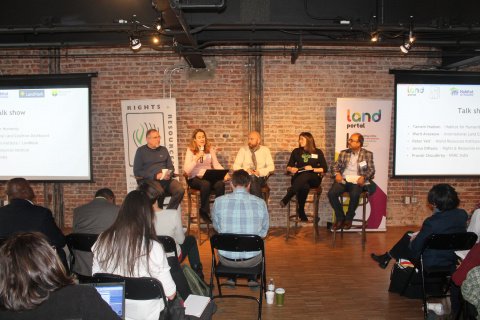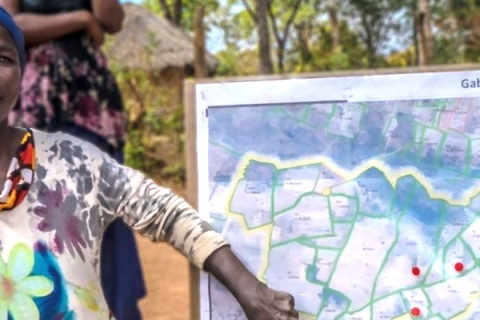Descubra historias ocultas y voces no escuchadas sobre asuntos de gobernanza de la tierra en el mundo. Aquí es donde la comunidad del Land Portal comparte actividades, experiencias, desafíos y éxitos.

Siga nuestra serie de blogs sobre Objetivos de Desarrollo Sostenible! !
Issues
Geographical focus
“No sé si toda mi vida voy a trabajar la tierra”, así expresó Carla —una joven de una comunidad del municipio de Palacagüina en el departamento de Madriz, quien trabaja en tierra ajena, lo hace a medias con otra mujer que utiliza la parcela del marido— al participar en un estudio que realiza el Instituto de Investigación y Desarrollo Nitlapan-UCA, la Asociación para la Diversificación y Desarrollo Agrícola Comunal (Addac) y Octupan sobre la situación de jóvenes rurales y su acceso a la tierra.
“No sé si toda mi vida voy a trabajar la tierra”, así expresó Carla —una joven de una comunidad del municipio de Palacagüina en el departamento de Madriz, quien trabaja en tierra ajena, lo hace a medias con otra mujer que utiliza la parcela del marido— al participar en un estudio que realiza el Instituto de Investigación y Desarrollo Nitlapan-UCA, la Asociación para la Diversificación y Desarrollo Agrícola Comunal (Addac) y Octupan sobre la situación de jóvenes rurales y su acceso a la tierra.
Imagine you're a local sustainability officer developing an initiative to reduce emissions. But you don't know how many emissions the city produces, or where they're coming from. You don't know who the city's biggest energy users are, how many cars are on the road, or the amount of waste produced every year. And even if you can set goals for reducing emissions, you have no way of measuring progress against them.
New technology has unleashed a wave of opportunities to secure formal land rights for hundreds of millions of people, but it is not a solve-all solution in countries with weak institutions, said a senior World Bank economist.
Satellite imagery, drones, cloud computing and blockchain are among technologies with the potential to help many of the world’s more than 1 billion people estimated to lack secure property rights, said the World Bank’s Klaus Deininger.
First global benchmark for measuring and reporting land information aims to improve tenure security and enable fair compensation
The potential for conflicts related to large-scale land acquisitions could be cut down significantly if seven key pieces of information are included in every property transaction, land professionals say.
Desde la invasión de las Américas –lo que es conocido como “descubrimiento” – por los colonizadores europeos, el conflicto por la tierra siempre fue una constante en la historia de estos territorios. Indígenas, pueblos originarios, campesinos y comunidades quilombolas[1], entre otros actores que luchan por el derecho a la tierra, son el cuerpo resistente al proceso de colonización que nunca terminó.
After years of efforts, land rights are finally getting global attention. With several land-related indicators included in the Sustainable Development Goals, the land sector now has the unique opportunity to create an unprecedented momentum around land tenure issues and bring it to a higher level on the development agenda. Our goal is, of course, to contribute to the success of the SDGs, but also to be part of sustainable development in its real and practical sense!
Much of the world’s rural landscapes are technically managed by national governments with limited recognition of, or support for, the rights and management responsibilities of the rural poor who live in these areas. In an era of large-scale land acquisitions for global commodity production, this has led, in some cases, to governments allocating vast tracts of land and resources to companies with limited or no consultation of the people affected.
For hundreds of years, pastoralists in Ethiopia’s lowlands have relied on strong customary land tenure systems to survive. Historically, legislation has failed to clearly define communal rights to rangelands, and the specific roles and responsibilities for both communities and local government to administer and manage these resources. This legislative deficiency prevented pastoral communities from fully exercising their constitutional rights to land (Ethiopia’s Constitution broadly recognizes pastoral communities’ right to access land and prevents their involuntary displacement).
Margarita Varón
Fundadora y Gerente de Colombia Rural
Hoy la Corte Constitucional tiene que decidir sobre la constitucionalidad del Decreto Ley 902, aquí tres argumentos para salvarla.
On World Water Day, the UN General Assembly (UNGA) launched the ‘International Decade for Action: Water for Sustainable Development’ (2018-2028). Promoting the integrated management of water resources, the Decade aims to create a platform for sharing good practices, advocacy, networking and partnership-building at all levels. It will support achievement of the water-related aspects of the 2030 Agenda for Sustainable Development, the Sendai Framework for Disaster Risk Reduction 2015-2030, and the Paris Agreement on climate change.
Por María Cianci Bastidas / ALER [1]










